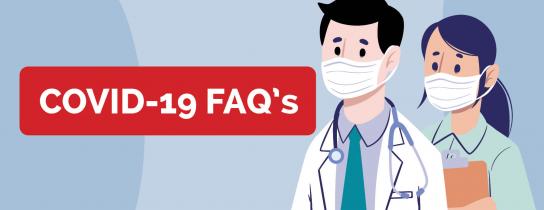COVID-19 Frequently Asked Questions

FAQ’s
Common Questions You May Ask About the COVID-19 Vaccine
Should I get vaccinated for COVID-19?
Crystal Run physicians strongly recommend everyone who can, get vaccinated. The vaccine will help protect you from getting COVID-19. If you still get infected after you get vaccinated, the vaccine may prevent serious illness. By getting vaccinated, you can also help protect people around you.
Can the vaccine give me COVID-19?
No. None of the COVID-19 vaccines currently authorized for use or in development in the United States use the live virus that causes COVID-19. However, it typically takes a few weeks for the body to build immunity after vaccination. That means it’s possible you could be infected with the virus that causes COVID-19 just before or just after vaccination and get sick.
If I already had COVID-19 and recovered, do I still need to get vaccinated?
Yes. CDC recommends that you get vaccinated even if you have already had COVID-19, because you can catch it more than once. While you may have some short-term antibody protection after recovering from COVID-19, we don’t know how long this protection will last.
Can my child get vaccinated for COVID-19?
No. More studies need to be conducted before COVID-19 vaccines are recommended for children aged 16 and younger.
Is it safe to get a COVID-19 vaccine if I have an underlying medical condition?
Yes. COVID-19 vaccination is especially important for people with underlying health problems like heart disease, lung disease, diabetes, and obesity. People with these conditions are more likely to get very sick from COVID-19. You should speak with your physician to discuss your specific circumstances.
Is it better to get natural immunity to COVID-19 rather than immunity from a vaccine?
No. While you may have some short-term antibody protection after recovering from COVID-19, we don’t know how long this protection lasts. Vaccination is the best protection, and it is safe. People who get COVID-19 can have serious illnesses, and some have debilitating symptoms that persist for months.
Why do I need two COVID-19 shots?
Currently authorized vaccines, and most vaccines under development, require two doses of vaccine. The first shot helps the immune system recognize the virus, and the second shot strengthens the immune response. You need both to get the best protection.
Will the shot hurt or make me sick?
There may be side effects, but they should go away within a few days. Possible side effects include a sore arm, headache, fever, or body aches. This does not mean you have COVID-19. Side effects are signs that the vaccine is working to build immunity. If they don’t go away in a week, or you have more serious symptoms, call your doctor.
Are there long-term side effects from COVID-19 vaccine?
Because all COVID-19 vaccines are new, it will take more time and more people getting vaccinated to learn about very rare or possible long-term side effects. The good news is, at least 8 weeks’ worth of safety data were gathered in the clinical trials for all the authorized vaccines, and it’s unusual for vaccine side effects to appear more than 8 weeks after vaccination.
How do I know if COVID-19 vaccine is safe?
All COVID-19 vaccines were tested in clinical trials involving tens of thousands of people to make sure they meet safety standards and protect adults of different ages, races, and ethnicities. There were no serious safety concerns. CDC and the FDA will keep monitoring the vaccines to look for safety issues after they are authorized and in use.
How do I report problems or bad reactions after getting a COVID-19 vaccine?
We are encouraging all recipients who receive the vaccine to enroll in v-safe. This is a smartphone tool you can use to tell CDC if you have any side effects after getting a COVID-19 vaccine. If you report serious side effects, someone from CDC will call to follow up. When you are vaccinated, you should be given instructions for how to enroll.
Questions People May Ask About COVID-19 Vaccines reference CDC | www.cdc.gov/coronavirus/vaccines

 Optum Radiology at Crystal Run Healthcare
Optum Radiology at Crystal Run Healthcare Same and next-day pediatric appointments
Same and next-day pediatric appointments